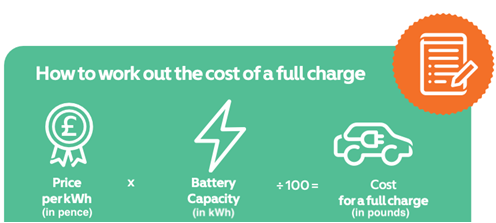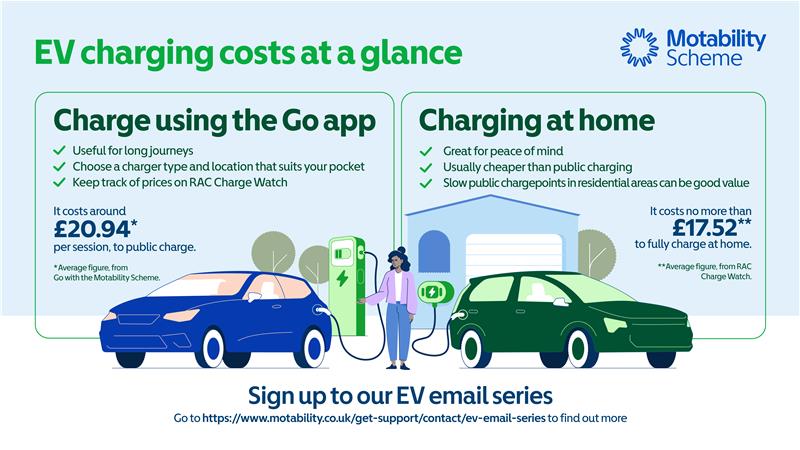When you’re deciding which type of new car to get, knowing how much it will cost to run is an important part of your decision. Electric vehicles (EVs) are often cheaper to run than petrol or diesel cars. But the cost depends on when, where, and how you charge.
Are you trying to figure out how much it costs to charge an EV at public chargepoints, and how that compares to charging at home? Or how the running costs of an EV stack up against petrol and diesel cars? Let’s look at some simple stats to give you an idea.
- How to work out the cost of fully charging an EV
- Charging your EV on the go
- What affects the cost of charging an EV on the go?
- Charging on the go vs charging at home
- How EV charging costs compare to petrol or diesel costs?
- Top tips to save you money when using public chargepoints
How to work out the cost of fully charging an EV
It’s very unlikely you’ll ever charge your EV from zero to 100%. That would be like a petrol or diesel driver using the cost of a full tank to judge how expensive their car is to run.
Instead, you can use our simple formula to estimate the cost of charging any EV. It gives you a rough idea of what you’ll pay, whether you’re charging at home or using public chargepoints.
Give it a try when you’re browsing and considering EVs on our site. You’ll find each EV’s battery capacity under ‘Performance’, when you’re searching.
You can also use Zapmap’s public charging cost calculator to estimate the cost of fully or partially charging your electric car when using the public charging network.
If you charge at home using a home chargepoint, working out the costs is fairly simple. But if you rely on public chargepoints, the cost can vary a lot.
Here’s how much you’re likely to pay when charging on the go. But first let’s look at what influences the cost of public chargepoints:
- Which factors affect the cost
- Some examples of costs and compare them to home charging costs
- How EV charging costs compares to the cost of petrol or diesel
Factors affecting the cost of charging electric vehicles on the go
The cost of charging your EV away from home depends on several things:
- Chargepoint location: Charging at motorway services usually costs more than charging elsewhere
- The charging network you use: Some networks cost more than others
- Energy costs: The price or ‘tariff’ charged by the energy supplier in pence per kilowatt hour, or kWh, at any time. Some charge a flat rate, and some have peak and off-peak rates
- Charging speed: Slow, fast, rapid or ultra-rapid chargers charge differently. Faster chargers usually cost more per kWh
- Subscriptions: If you subscribe to a charging network, you’ll often pay less than with pay as you go
- Battery size: Larger batteries cost more, as they travel further on a single charge. So the bigger your battery, the more it will cost to charge
Charging on the go versus charging at home
Here’s how public charging compares with charging at home.
What’s the average cost of using a public chargepoint?
Lots of numbers can be confusing, so here are the two stats you need to know most: the cost per kWh, and cost per mile. You can also see how long it takes to charge using each of these chargepoint types.
| Charger speed | Cost per session |
| Slow / 3 to 5 KW | £15.70* |
*Average figure from Go with the Motability Scheme
| Charger speed | Cost per kWh* | Cost per mile** |
| Fast / 7 to 22 kW | 70.80p | 20.23p |
| Rapid / 43 to 50 kW | 81.35p | 23.24p |
| Ultra-rapid / 100 to 350 kW | 82.52p | 23.58p |
*Average figures, from RAC Charge Watch for ‘pay as you go’ charging.
What’s the typical cost of charging at home?
As of Spring 2025*, a driver charging an EV with a 64kWh battery from 0% to 100%, at home, costs up to £17.52. That’s roughly 6.8p** per mile. Some energy providers offer cheaper overnight tariffs, which can reduce this cost more.
Charging an EV at home costs considerably less than using a public chargepoint. Slower public chargepoints in residential areas are often priced lower, which can bring cost of charging on the go a little closer to home charging. You’ll often find these in supermarket car parks or on residential lampposts.
Occasionally, you might come across a free public chargepoint. You’re more likely to find these if you subscribe to a network, like bp pulse.
*Figures from RAC Charge Watch, based on Ofgem’s capped rates for standard variable domestic electricity tariffs.
Use our handy EV calculator to compare the running costs of an EV to a petrol or diesel car.
-
Choose the size of your current vehicle and how much mileage you drive each year.
-
Under ‘Charging mix’, tell us how much you expect to do at home versus on the go.
-
See how much an EV could save you each year.
If you’re worried about range, a long-range EV might be right for you. There’s something to suit everyone on the Motability Scheme, including some EVs with no Advance Payment.
Top tips to save you money at public chargepoints
Ready to save some money when you charge on the go? You can check the chargepoint in person, on Zapmap, or in Go with the Motability Scheme.
One top tip is to look for free chargepoints at supermarkets or workplaces. Just remember these can be slower and busier.
Here are some other ways you can keep your costs low:
-
Try not to charge at peak times
-
Get a subscription to an energy provider. This will help you find the best price for charging your EV and even some free chargepoints
-
Ask a friend who lives nearby if you can use their home chargepoint
-
Check RAC Charge Watch regularly to keep track of prices
Learn more about EVs in our electric car series
Our helpful email series is designed for anyone who wants to learn more about electric cars.
You’ll get one email a week for eight weeks, covering how EVs work and what everyday life with one can look like, including a guide to EV charging.
Related articles
Electric cars available on the Motability Scheme
Electric Cars: Information and Driver’s Guide
Electric car charger basics: EV connector types and charging cables
![]()










